
Roger Trangsrud Named Interim Dean | Student Serves on International Tribunal | Breaking New Ground: GW Law’s International Human Rights Clinic | Foreign Judges Visit GW | Grading the Professors | Award Honors Memory of GW Law Student | GW Law on Parade | A Presidential Honor | Munich IP Program Begins Second Semester | Networking Forum Features SEC Commissioner | IP Students Dominate Competitions | GW Law Hosts Group from Kuwait | Public Interest Corner | Faculty File
Roger Trangsrud Named Interim Dean
Search committee is formed to find Young’s replacement
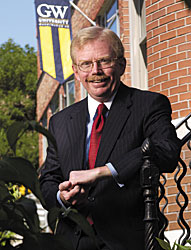 |
|
Photo by Dave Scavone
|
In June, Roger Trangsrud, senior associate dean for academic affairs and the Oswald Symister Colclough Research Professor of Law, was appointed interim dean of GW Law School. He takes the helm from Michael K. Young, who leaves this summer to become president of the University of Utah.
“The Law School is in experienced hands with Dean Trangsrud,” says GW President Stephen Joel Trachtenberg. “His two decades of service with us will be invaluable in keeping the school moving forward as one of the nation’s premier institutes of legal education.”
In 1982, Trangsrud joined GW Law, where he has taught civil procedure, federal jurisdiction, remedies, and complex litigation. In 1993 he was appointed associate dean for academic affairs and in 2000 he was appointed senior associate dean for academic affairs.
In addition to his career with GW Law, Trangsrud’s experience includes serving on the University of Chicago Law Review; clerking for Justice Walter Rogosheske of the Minnesota Supreme Court; practicing with the Washington firm of Hogan & Hartson; and writing extensively on the fields of complex litigation and jurisdiction.
“I am deeply honored that President Trachtenberg and Executive Vice President (for Academic Affairs Donald R.) Lehman have selected me to serve the Law School in this way,” Trangsrud says. “In the coming year, I look forward to continuing the academic initiatives, the building plans, and the overall institutional agenda that Michael Young and the law faculty have established for the Law School.”
A search committee chaired by Roger Schecter that includes faculty members Peter Raven-Hansen, Cheryl Block, Karen Brown, Todd Peterson, Ralph Steinhardt, Robert Tuttle, and GW Vice President and General Counsel Dennis Blumer has been established to find Young’s replacement. Alumni and student advisory committees will help the search committee in its mission.
Student Serves on International Tribunal
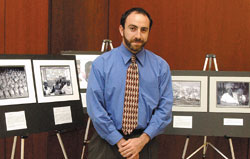 |
|
Jared Fishman, JD ’04, with photographs he took while working on the International Criminal Tribunal for Rwanda. His photos were on display in an exhibit in the Jacob Burns Law Library. Photo by Paul Fucito
|
In the summer of 2003, Jared Fishman, JD ’04, worked in Arusha, Tanzania, for the Office of the Prosecutor at the International Criminal Tribunal for Rwanda, part of a global effort to help the African country’s citizens find justice, heal, and rebuild. The scars of conflict and genocide remain from the atrocities the country suffered beginning in April 1994, when between 500,000 and one million people were massacred during the Hutu extremists’ attempt to eliminate Rwanda’s Tutsi population.
A recipient of a $3,000 Reuben A. Zubrow Fellowship from the Law School’s Public Interest Committee, Fishman spent most of his time in Tanzania, helping to build the case against those most accountable for the genocide. Fishman worked with translators to interview and prepare witnesses—a group that included survivors and perpetrators, visited massacre sites, and wrote pre-trial briefs and legal arguments.
“Rwanda is a poor country facing lots of uphill battles,” Fishman says. “The effects of war—even a decade later—are far-reaching. In Rwanda, HIV is out of control; countless people are still suffering physically and emotionally from the effects of genocide; the jails are crowded; the street children are forced to act as the head of the household.
Fishman is not the only GW Law student to be chosen for international tribunal work. Skye Justice, a 1L, will travel to Tanzania to work on the Rwanda tribunal this summer. Jaspreet Saim, a 2L, was selected for a six-month clerkship with the International Criminal Tribunal for the former Yugoslavia.
Fishman was selected for the job because he had experience in conflict and post-conflict resolution, having spent two years working for peace in Israel-Palestine and Bosnia. He gained further knowledge at GW Law, participating in the International Human Rights Clinic and Federal Appellate Criminal Clinic. Now, he shares these experiences and his memories of Rwanda and Tanzania with high school and university students through photos, exhibits, and discussions.
“Coming back to the United States was a challenge—it’s striking how little international news there is in the media here,” Fishman says. “But when I talk to people, I see that they ask a lot of questions and are curious and surprised about my experiences. The more people learn, the more they want to know.”
Fishman wants to know more about the tribunal as well—as of press time, he is expecting to hear about the verdict of the trial any day. In the meantime, he is looking for a job in the areas of transitional justice and legal development to further expand his skills and ideas.
“I’ve seen the function of international legal institutions from the inside. I’ve met with survivors and have seen how justice can meet their needs, or how it has failed them,” Fishman says. “In my opinion, the tribunal was out of touch with the Rwandans. It’s so important to make justice more accessible to the people.”
It’s also important, Fishman says, to remain focused on peace.
“It’s an enormous undertaking to rebuild a war-torn country. It’s imperative to prevent war in the first place,” he says. “It’s impossible to put Humpty Dumpty back together again.”
—Laura Ewald
Breaking New Ground: GW Law’s International Human Rights Clinic
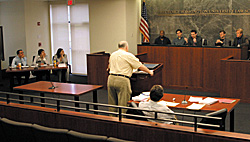 |
|
Students in the IHR Clinic participate in the moot court session for the lawyers who subsequently presented oral arguments to the Supreme Court in Sosa v. Alvarez Machain, Paul Hoffman (standing) and Professor Ralph Steinhardt. From left to right: Brad Parr, 3L; Bonnie Miluso, 3L; and Rebecca Hamburg, 3L. Faculty judges, from left: Professors Paul Butler, Thomas Colby, Jonathan Siegel, Sean Murphy, and Robert Brauneis. Photo by Rick Reinhard
|
|
As the only law school clinic in the country dedicated to litigating human rights cases before national and international tribunals, the new International Human Rights Clinic at GW Law has wasted no time in blazing new trails. Students in the spring of 2004 worked on several cutting-edge human rights projects, including a case before the U.S. Supreme Court. The clinic’s founder and director, Visiting Professor Arturo Carrillo, is a seasoned human rights law practitioner and teacher who previously directed Columbia Law School’s Human Rights Clinic. By bringing talented students together with experienced practitioners to work on live human rights cases, Carrillo has created a dynamic learning environment that actively contributes to the human rights movement in the United States.
|
The clinic moved immediately to the forefront of U.S. human rights litigation with its first case. In January 2004 students in joined the legal team that briefed and argued Sosa v. Alvarez Machain before the U.S. Supreme Court. This seminal case raised the issue of whether the Alien Torts Claims Act—a statute allowing aliens to bring human rights cases to federal court—created a cause of action for violations of the “law of nations” or a U.S. treaty. The lead attorneys, including GW Professor Ralph Steinhardt, relied substantially on the students’ research memos in the preparation of the pleadings submitted to the Court in late February. As a result, the clinic is recognized on the briefs as counsel for respondent Alvarez-Machain. In preparation for the oral arguments held in March, the clinic hosted a moot court session for Paul Hoffman, the attorney charged with arguing the case, with the active participation of GW Law faculty and the clinic students.
While one team of students struggled to preserve the rights of victims to file human rights cases in U.S. courts, another group was hard at work putting together a legal action on behalf of several victims of a brutal African dictator. These students assisted lawyers from the Center for Justice and Accountability in San Francisco to prepare a case for filing under another federal statute, the Torture Victims Protection Act, that involves widespread killings, torture, rape, and other atrocities committed by government and military officials. Students interviewed victims, witnesses, and experts. They also drafted administrative requests for information from government agencies under the Freedom of Information Act, as well as substantive appeals when the requests were denied.
Natalie Chin, a student working on the case, described her experience as both challenging and rewarding. “I had a unique opportunity to work directly with a client who wished to bring a human rights claim. … In the study of international law, it is sometimes difficult to realize how it applies on a human level—and participation in the clinic gave me an invaluable chance to see this interconnection.”
The clinic’s third project of the spring 2004 semester is perhaps its most innovative and ambitious. Students were paired with military lawyers from the Department of Defense’s Office of General Counsel. The students provided legal research and analysis under international law to the attorneys, who are defense counsel from the DoD’s Office of Military Commissions. They are charged with representing a Guantanamo Bay detainee in criminal proceedings before the military commissions established by President Bush to try alleged terrorist suspects accused of committing crimes under the laws of war. Students assisted the military defense attorneys by preparing memoranda addressing novel questions arising under international law, including the basic due process right of “enemy combatants” in times of armed conflict.
Both the collaboration with CJA and the technical assistance provided to the DoD’s Office of Military Commissions are ongoing projects slated to continue into the 2004-05 academic year. Two students will be working with Carrillo during the summer of 2004 to ensure the continuity of the clinic’s work on these initiatives.
Launching an innovative and successful human rights clinic has not been easy, Carrillo says. “If it weren’t for the support of the Law School faculty and students, as well as the dedication of our partners in the field, none of this would have been possible,” notes Carrillo, who also is responsible for raising funds to support the IHR Clinic. “The challenge now,” he says, “is to raise the resources necessary to make the clinic a permanent addition to the already formidable clinical and human rights curricula at GW Law.” According to Carrillo, the goal is to make sure students continue to have practical opportunities to apply international law and hone their professional skills while promoting human rights principles at home and abroad.
For more information on the IHR Clinic and its activities, please visit the clinic’s Web site, www.law.gwu.edu/ihrc.
Foreign Judges Visit GW
This past fall, the U.S. Department of Commerce funded the visit of two Algerian judges, who came to GW to learn more about intellectual property law. The United States is helping Algeria reform its judicial system so that Algeria can be in a position to consider joining the World Trade Organization. Also, each year for the past three years, the Law School has hosted a visiting judge from Japan.
The visiting judges are shown here during a visit to the White House and the Capitol.
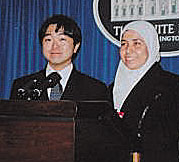 |
Tomohiro Nakajima, a judge from the Tokyo District Court, and Algerian Judge Nessaibia Khedija at the White House.
|
|
Khedija and Algergian Judge Ait Said Moundji (third from right) with GW Law LLM students outside of the Capitol.
|
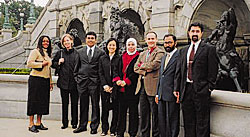
|
|
Grading the Professors
In the classroom, professors are kings. However, at the end of the semester, the tables are turned. On the last day of classes, students fill out report cards on their professors and their just-concluded courses. They rate the professors on their expertise, organization, presentation skills, relationship with students, and choice of course materials. They also provide overall grades for the course and the professor and are encouraged to provide written comments to supplement their scorecards.
GW Law takes its student teaching evaluations seriously. Interim Dean Roger Trangsrud, explains, “The Law School administration reads every student evaluation closely to understand how our professors are performing in the classroom and how they might improve.” Professors then are briefed on their performance.
Trangsrud says, the goal of evaluations is two-fold. “Our intent is to continually improve students’ learning experience at the Law School while also helping develop our faculty’s professional skills.”
The effect of student evaluations can be pronounced. Such evaluations have significant influence on faculty hiring and promotion decisions. Instructional ability is a primary criterion for assessing professional performance in tenure decisions, for example. In addition, student evaluations of professors are posted on the Law School Web site to help students choose their courses. This system empowers students and holds professors accountable for their performance in the classroom.
Written student evaluations generally are very supportive of the faculty and show a good balance of enthusiastic approval and constructive criticism. Numerical scoring of the evaluations shows steady improvement in instructional performance over the years.
Trangsrud, who has been following professors’ performance for years in his role overseeing the faculty, notes across-the-board improvements in the quality of classroom education at the Law School. “Our teachers today are extraordinarily effective at many different kinds of teaching, including Socratic interrogation, lecture, problem-solving classes, and simulation exercises. They just keep getting better and better.”
Recent student evaluations affirm Trangsrud’s assessment. Many students report in written comments that certain Law School professors are the best teachers they have ever had. Professors who recently have been called a “best professor” by student evaluators include Alberto Benitez, who teaches immigration law; Paul Butler, who received such an evaluation from his course on race, racism, and American law; Stephanie Ridder, who received the 2001 Adjunct Faculty Teaching Award; and Arturo Carrillo, a visiting professor who teaches a course on human rights lawyering. Professors Roger Schechter, Jonathan Molot, Todd Peterson, and Spencer Overton, among others, also have received near-perfect student grades on their teaching and similar praise as “best teacher ever.” We learn from other evaluations that Professor and former GW Law Dean Jack Friedenthal is “the man” while Professor Gregory Maggs is, simply, “God.”
Trangsrud likes to read superlative evaluations from students, but he is not surprised by them given the Law School’s rigorous standards and reputation for excellence in teaching.
The Law School’s newest crop of faculty members is no exception to that rule. Overall, student evaluations paint a bright picture of the current classroom experience at the Law School. It is sometimes easy to forget, with all the activity going on inside and outside the school—particularly the constant improvements to its physical facilities—that the core function of the Law School takes place, as it always has, inside the classrooms.
—David Burnett
Award Honors Memory of GW Law Student
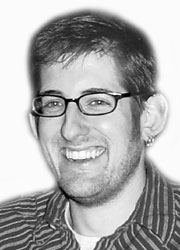 Just a few hours after completing his final examinations in December, Chris Bartok, a 1L from Morro Bay, Calif., passed away in an accidental drowning. The GW Law community mourned the loss of a dedicated student and a caring friend by holding a memorial service in January in the Marvin Center.
Just a few hours after completing his final examinations in December, Chris Bartok, a 1L from Morro Bay, Calif., passed away in an accidental drowning. The GW Law community mourned the loss of a dedicated student and a caring friend by holding a memorial service in January in the Marvin Center.
“Chris was a likable individual and a good student who asked insightful questions. He had both motivation and dedication, and his presence in our class will be greatly missed,” says Interim Dean Roger Trangsrud, Bartok’s civil procedure professor.
In his honor and in recognition of his desire to study patent law, Bartok’s mother, Carol DiNolfo, established the Chris Bartok Memorial Award in Patent Law. The award, which includes a monetary prize of $500, will be given annually to the graduate in the JD program who exhibits the highest degree of excellence in the field of patent law. Because her son was “so passionate about this field of study,” DiNolfo says it was her wish to honor his memory by giving the prize to “an outstanding graduate who exhibits that same bright spark.”
GW Law on Parade
Ruedee “Mint” Euachongprasit, a GW Law LLM student, represented her home country of Thailand as an international cherry blossom princess during the National Cherry Blossom Festival Parade April 3. Accompanying her is Tomohiro Nakajima, an LLM student from Japan.
|
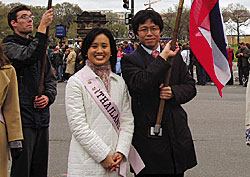 |
A Presidential Honor
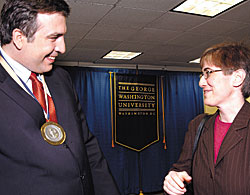 Georgian President Mikheil Saakashvili speaks with Associate Dean Susan L. Karamanian after receiving the GW President’s Medal. GW President Stephen Joel Trachtenberg presented the medal to Saakashvili—who took classes at GW Law in 1995, pursuing a degree in international and comparative law—at a ceremony in the Marvin Center Ballroom in February. The event was attended by Levan Mikeladze, the Georgian ambassador to the United States. The President’s Medal is the University’s highest honor.
Georgian President Mikheil Saakashvili speaks with Associate Dean Susan L. Karamanian after receiving the GW President’s Medal. GW President Stephen Joel Trachtenberg presented the medal to Saakashvili—who took classes at GW Law in 1995, pursuing a degree in international and comparative law—at a ceremony in the Marvin Center Ballroom in February. The event was attended by Levan Mikeladze, the Georgian ambassador to the United States. The President’s Medal is the University’s highest honor.
After a peaceful “Revolution of the Roses” led by Saakashvili’s opposition National Movement in November 2003 that led to the resignation former Georgian President Eduard Shevardnadze, Saakashvili was elected president in January with 96 percent of the vote. Saakashvili also has served as chairman of the Parliamentary Committee on Legal Issues, Rule of Law and Administrative Reform; chairman of the Majority Fraction of the Georgian Parliament; and justice minister of Georgia.
Other recipients of GW’s President’s Medal include Mikhail Gorbachev, Walter Cronkite, and Sen. Joseph Lieberman (D-Conn.).
Photo by Claire Duggan
Munich IP Program Begins Second Semester
The new Intellectual Property LLM Program at the Munich Intellectual Property Law Center began its first year of operation last October with students drawn from five of the world’s six inhabited continents. After a successful first semester, the students all completed internships at organizations such as the European Patent Office and the German Patent and Trademark Office, firms such as Siemens, or prominent Munich intellectual property law firms. Though most students stayed in Munich, some traveled as far as Ghana (to the Center for Research in Plant Medicines) and Canada (to the Canadian Intellectual Property Office). Students have now begun their second semester of studies and are busy not only with advanced courses but with the preparation of theses. GW Law Professors Robert Brauneis and Martin Adelman—co-directors of GW Law’s Intellectual Property Program—and adjunct professor Judge Randall Rader, JD ’78, have already been to Munich to teach in the program. GW Professors John Duffy, Laura Heymann, Dawn Nunziato, and Roger Schechter also will teach in the program this summer. At the same time, these professors will take part in a new GW Law Intellectual Property Summer Program in Munich.
For more information on the Munich Intellectual Property Law Center, a project of the GW Law School, the Max Planck Institute for Intellectual Property, the University of Augsburg, and the Technische Universität München, visit www.miplc.de. For more information on the GW Munich IP Summer Program, visit www.law.gwu.edu/tech/munich.asp.
|
Networking Forum Features SEC Commissioner
 |
|
Securities and Exchange Commission Commissioner Roel Campos. Photo by abdul el-tayef/wppi
|
The Law School’s Corporate Law Society is a relatively new student organization committed to developing a community of GW students, professors, and alumni who share an interest in corporate law. The society recently organized its first annual Professional and Networking Forum at the Law School. The forum featured keynote speaker Roel Campos, commissioner of the Securities and Exchange Commission. The well-attended event also featured a panel that was moderated by Interim Dean Roger Trangsrud.
Students, faculty, staff, and local attorneys enjoyed presentations by Campos and two prominent Law School graduates: Kenneth E. Adelsberg, JD ’79, a partner in the corporate practice at Pillsbury Winthrop in New York; and Steven A. Tasher, JD ’73, vice president for environmental affairs and facilities operations and associate general counsel of pharmaceutical corporation Wyeth (see profile of Tasher).
Each panelist spoke about their experiences in the field of corporate law.
Campos describes his career as “the triumph of the generalist” given his wide-ranging work experience that includes military service, 15 years as a corporate transactions/securities lawyer in Los Angeles, and a position as a federal prosecutor in the U.S. Attorney’s Office in Los Angeles, where he successfully prosecuted major narcotics cartels. Campos emphasized the public service thread running through his career, and encouraged GW Law students to consider public service at some point in their careers. He closed by saying, “The single most important determinant of future success is not your school, your law school rank, or your grades. It is your integrity and honesty.”
Adelsberg, who took the podium next, graduated in 1979 with high honors from the Law School, where he served on the George Washington Law Review and was a member of the Order of the Coif. Adelsberg explained that, in being a corporate lawyer, negotiations are not as dramatic as on television. Adelsberg said he considers corporate negotiations tougher than lawyering in court, since trial attorneys only have to convince an unbiased judge or jury, whereas corporate lawyers have to convince clients and then antagonistic adversaries.
The third and final speaker was Tasher, who also is a member of the Law School’s Board of Advisors. Tasher encouraged Law School students to consider a career in government, which he considers “a noble calling” and which “can produce good contacts and good experience.” He reminded students that, in contrast to the many advancement opportunities that exist in government service, in his estimation only one in 20 beginning associates make partner in law firms.
Grace Fan, president of the Corporate Law Society, was very pleased with the event. “There is so much the speakers can teach us and a combined one-hour presentation could not even begin to capture the complexity of what they do,” she said. “I hope the students will have the opportunity to see these speakers and other alums again on campus soon.”
—David Burnett
IP Students Dominate Competitions
For the third consecutive year, a GW Law student won the nationwide Robert C. Watson Award, an annual prize for the best piece of student writing in the area of intellectual property sponsored by the American Intellectual Property Law Association. Raj Davé, LLM ’03, won the 2003 award for his paper “A Mathematical Approach to Claim Elements and the Doctrine of Equivalents.” The award and $2,000 monetary prize were presented to Davé during a ceremony at the AIPLA’s annual meeting in October.
The paper also took first place in the 2003 Marcus B. Finnegan Prize competition—a contest exclusive to GW Law students. It included a $5,000 cash prize, which Davé donated to the Law School—and a National Award at the 2003 Judge John R. Brown Award for Excellence in Legal Writing. The paper was published in the Harvard Journal of Law and Technology.
The paper was his thesis for his LLM in patent law and was inspired by his opinion that the doctrine of equivalents has never been discussed in a mathematically quantifiable manner.
Associate Professor Robert Brauneis, co-director of the IP Law Program, says the faculty encourages students—including Davé and fellow Watson Award winners Hernan L. Bentolila, LLM ’02, and Gretchen Ann Bender, LLM ’01—to enter writing and moot court competitions by providing them with a comprehensive database of IP competition listings, www.law.gwu.edu/tech/competitions.asp.
“We are proud that our IP students do truly outstanding work,” Brauneis says. “We want to see them continue to get the recognition that they deserve.”
GW Law Hosts Group from Kuwait
In April the Law School hosted the University of Kuwait Jessup International Moot Court Team. The team and their coaches, including Professor Mohammad Buzubar, Professor Nada Al-Duaij, and Vice Dean Mohammad Al-Moqatei, are shown here along with GW Law Associate Dean Susan L. Karamanian.
|
 |